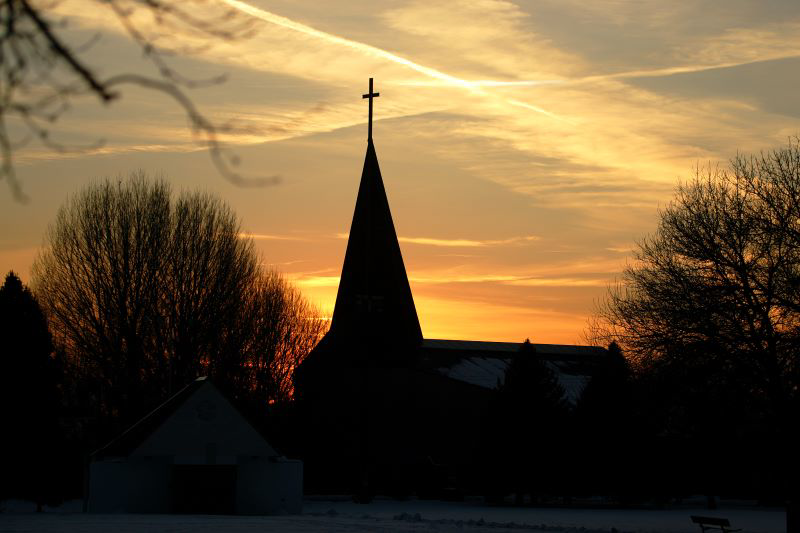Sheep in Need of a Shepherd (Part 2)
Sign up for a six month free
trial of The Stand Magazine!
Like sheep, we are defenseless.
We come into this world as fallen sinners.
We enter this world, as Paul told in Ephesians 2:12, “… without Christ, … having no hope, and without God in the world.”
As sheep, we face a powerful enemy, against whom we are defenseless without our shepherd.
Peter, using the same imagery of Christians being sheep and Christ being the shepherd, said, “Be sober, be vigilant; because your adversary the devil, as a roaring lion, walketh about, seeking whom he may devour” (1 Peter 5:8).
Peter was reminding those believers that, as sheep, if they separated from the flock and got out from under the care of the shepherd, they were setting themselves up as prey for an enemy who wanted to destroy them.
Without our Good Shepherd, we are defenseless against the eternal punishment we deserve.
We come into the world without Christ, without hope, destined for hell, and there is not a single thing that we, as defenseless sheep, can do about it.
We can’t defend ourselves; we can’t do enough good works; we can’t pay our way out of our debt.
The only thing we can do is to put ourselves under the only one who can defend us.
When we trust in the Good Shepherd for salvation, He imputes to us a righteousness we can gain no other way.
And in that moment, the defenseless become the defended, because we are now in Christ Jesus.
[There is] therefore now no condemnation to them which are in Christ Jesus, who walk not after the flesh, but after the Spirit. For the law of the Spirit of life in Christ Jesus hath made me free from the law of sin and death (Romans 8:1-2).
Thank God that though we are defenseless, we have a shepherd who is willing and able to defend us, if only we submit to Him.
Like sheep, we are prone to wander.
All we like sheep have gone astray; we have turned every one to his own way; and the LORD hath laid on him the iniquity of us all (Isaiah 53:6).
At times, we get overconfident, independent, and self-reliant.
Sometimes we go through periods of doubt, anger, or rebellion. Sometimes we simply get distracted by the cares of this world. The grass can look greener on the other side, as the saying goes.
Whatever the draw, we are so feeble that we often wander away.
Oftentimes, we don’t even know we are wandering until one day we look up and realize we’ve drifted away from the flock and from the shepherd.
A pastor by the name of Robert Robinson was all too familiar with our human weakness and our tendency to wander away from God.
You may not be familiar with Robert Robinson, but I bet you are familiar with the hymn he composed in 1758, a hymn that dealt with the idea of our tendency to wander, a hymn we still sing today: Come, Thou Fount of Every Blessing.
Consider these lines from the hymn (emphasis added):
Here I raise my Ebenezer;
hither by thy help I’m come;
and I hope, by thy good pleasure,
safely to arrive at home.
Jesus sought me when a stranger,
wandering from the fold of God;
he, to rescue me from danger,
interposed his precious blood.
O to grace how great a debtor
daily I’m constrained to be!
Let that grace now, like a fetter,
bind my wandering heart to thee.
Prone to wander, Lord, I feel it,
prone to leave the God I love;
here’s my heart; O take and seal it;
seal it for thy courts above.
Thank God that we have a merciful and loving Good Shepherd who is aware of our tendency to wander, and who is aware when we wander away, and who will leave the 99 to find that one.
And not only will he find that wandering one, but he will bring him home to great rejoicing.
Like sheep, we are prone to blindly follow along.
In the same way that sheep are flock animals, we, too, have been designed by God to live in community, relationship, and fellowship with others.
The inherent risk within that, however, is that we tend to follow the crowd, to go along to get along. That is certainly prevalent in the world among the lost, but unfortunately, it can happen within the church as well.
Most of us are aware of painful situations where false teachers were able to lead well-meaning sheep astray, simply because the sheep blindly followed.
We are taught in Scripture to submit to authority and follow our leaders, but we are never told to do so blindly and certainly never told to do so at the expense of sound doctrine.
In fact, though we are led by undershepherds, we must look to and follow our chief shepherd (1 Peter 5:4).
The Berean believers (Acts 17) were more than willing to be led by Paul, but not at the expense of sound doctrine, not blindly. They were only willing to be led under the condition that the one leading them was first himself being led by God.
We might prefer to be likened to a lion or some other powerful or ferocious beast, but instead, we are likened to a sheep.
While it is true that sheep are fully dependent on their shepherd, the reality is that if they have a good shepherd, that lowly sheep will be better protected and better provided for than the most powerful beasts around them.
Why? Because those more powerful beasts are trusting in self, while the lowly sheep rests in the power of its shepherd.
Yes, as believers, we are likened to sheep, but we must remember we are sheep under the care of the Good Shepherd, the Lord Jesus Christ.
The irony is, though we are likened to the lowliest and least powerful of animals, because of our shepherd and his power, we are truly more powerful than all the rest.

Sign up for a free six-month trial of
The Stand Magazine!
Sign up for free to receive notable blogs delivered to your email weekly.



















